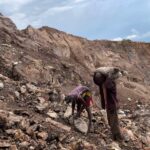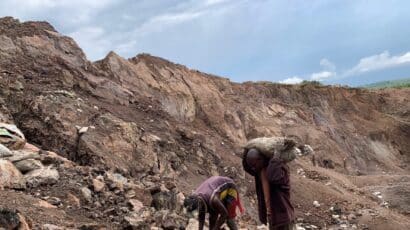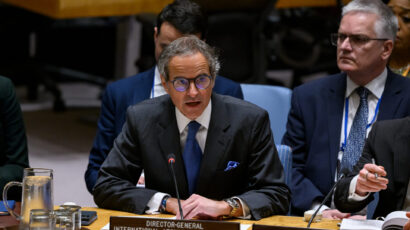If the Boston Marathon attack had involved dirty bombs
By George M. Moore | May 1, 2013
Last month’s Boston Marathon bombing was horrific enough without getting into ways in which it could have been worse. But in fact there is one avenue of speculation worth exploring, because doing so could help keep cities safe in the future: What if the explosive devices allegedly used by the Tsarnaev brothers had contained radioactive material? What would be the effect of such a so-called dirty bomb?
Last month's Boston Marathon bombing was horrific enough without getting into ways in which it could have been worse. But in fact there is one avenue of speculation worth exploring, because doing so could help keep cities safe in the future: What if the explosive devices allegedly used by the Tsarnaev brothers had contained radioactive material? What would be the effect of such a so-called dirty bomb?
To date, attempts or threats to use radioactive materials as weapons have surfaced only a few times. (Chechen separatists have been prominent among the perpetrators.) However, it's common for radioactive materials to go missing: the International Atomic Energy Agency's Incident Trafficking Database receives a new report of radioactive material that is out of regulatory control about every other day. Many experts believe it's only a matter of time before a dirty bomb or another type of radioactive dispersal device is used, with some expressing surprise that it hasn't happened already.
Although the Boston attackers did not use dirty bombs, with a little effort and planning they likely could have stolen radioactive materials from commercial or medical users, or from university research facilities. To be sure, the radioactive material they could have obtained likely would not have been the most dangerous kind. Plus, it's not clear how effective their pressure cooker bombs would have been at dispersing it. Many experts have noted that the most frequently-stolen types of radioactive materials — such as the type found in the moisture-density gauges used in construction — are unlikely to cause deaths by exposure to radiation.
That doesn't mean, though, that the impact of a dirty bomb attack won't be significant. The initial physical injuries due to the Boston explosives might have been essentially the same if dirty bombs were used, but the presence of radiation would have affected the response at every level.
Within seconds of the Boston blasts, the police and others were working to render aid to the victims. Some of the first responders probably carried simple "radiation pagers," devices that can detect the presence of some kinds of radiation. If the pagers had gone off, it could have hampered immediate assistance to victims. Police and firefighters would have been concerned not only with their own safety, but with that of others rushing to assist.
Had the Boston bombs been dirty bombs, a full-blown radiation response would have been required. The response planners would have had to deal with the fact that people not showing visible physical injuries could have ingested or inhaled radioactive material and been contaminated, or could have been exposed without being contaminated. Could Boston have established timely triage and contamination zones to prevent the movement of contaminated people and material out of the area — or would the situation have resembled the chaos in the 2004 movie Dirty War, a fictional account of a dirty bomb attack in London?
Health hazards. If the Boston marathon had been attacked with dirty bombs, hospitals would have received contaminated victims and patients with radioactive material embedded in them. Protocols for dealing with these problems could have led to delays and further loss of life.
Even if no victims were killed by radiation, there would be long-term medical repercussions. Public health officials would have to determine the radiation doses both to the people who were contaminated and to those who were merely exposed. The history of the few large-scale radiation exposure accidents, such as the 1987 incident involving a medical radiation source in Goiania, Brazil, indicates that the public's fear of all things involving radioactivity might greatly expand the medical response required. Medical personnel would need to deal with people who have not been exposed to radiation, but fear they have been.
Most of the radiation exposure from a dirty bomb would likely have no immediately observable effects, but could lead to stochastic effects, primarily radiation-induced cancers, in numbers that would be difficult to distinguish from normal cancer rates. However, the potential victims would probably demand to be tracked with programs that could last for many decades.
The victims of the Boston bombings and their families may suffer lifelong mental impacts in addition to injuries from the blasts. While the physical injuries from dirty bombs would be about the same, they could lead to a wider range of physical and mental effects. There would be a group of potential long-term victims left to wonder about their status for decades, uncertain as to whether the exposure they received would cause medical problems.
Legal reaction. The forensic response would also have to have been handled differently if radioactive material had been used. With the crime scene contaminated, it would have been more difficult to acquire and process all the photos and videos that turned out to be instrumental in tracking down the Tsarnaev brothers. Items that technicians were able to examine relatively quickly, such as parts of pressure cookers and circuit boards, might not have been available in the same time frame. Normal police forensic labs are not generally equipped to analyze radioactively contaminated items, and experts in nuclear forensics are few and far between. The work that the public observed done so quickly and efficiently in Boston would have required significant outside assistance. The effects could have delayed identification of the bombers, and perhaps allowed them to carry out more attacks.
Had radioactive materials been used, public officials would also have had to consider what level of cleanup Boston required. Contaminated material would have to have been removed and treated as radioactive waste, at great cost. The Environmental Protection Agency has standard decontamination guidelines, but the public might have demanded even more cautious ones.
Finally, any dirty bomb incident could have major political and legal ramifications. Modern tragedies of all types have generated calls for laws to ensure that whatever happened cannot occur again. Some of these new regulations end up well thought out, while others that initially appear helpful are counter-productive. Some, however logical, cannot survive the political process. The reaction to a dirty bomb would probably be just as messy.
It's not pleasant to think through worst-case scenarios, but in this case it's essential. The media, citizens, and all levels of government should undertake a thorough exploration of how to respond to a dirty bomb, so that they are prepared when one is actually used.
Together, we make the world safer.
The Bulletin elevates expert voices above the noise. But as an independent nonprofit organization, our operations depend on the support of readers like you. Help us continue to deliver quality journalism that holds leaders accountable. Your support of our work at any level is important. In return, we promise our coverage will be understandable, influential, vigilant, solution-oriented, and fair-minded. Together we can make a difference.
Topics: Analysis, Nuclear Weapons















